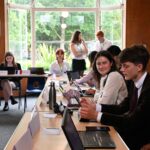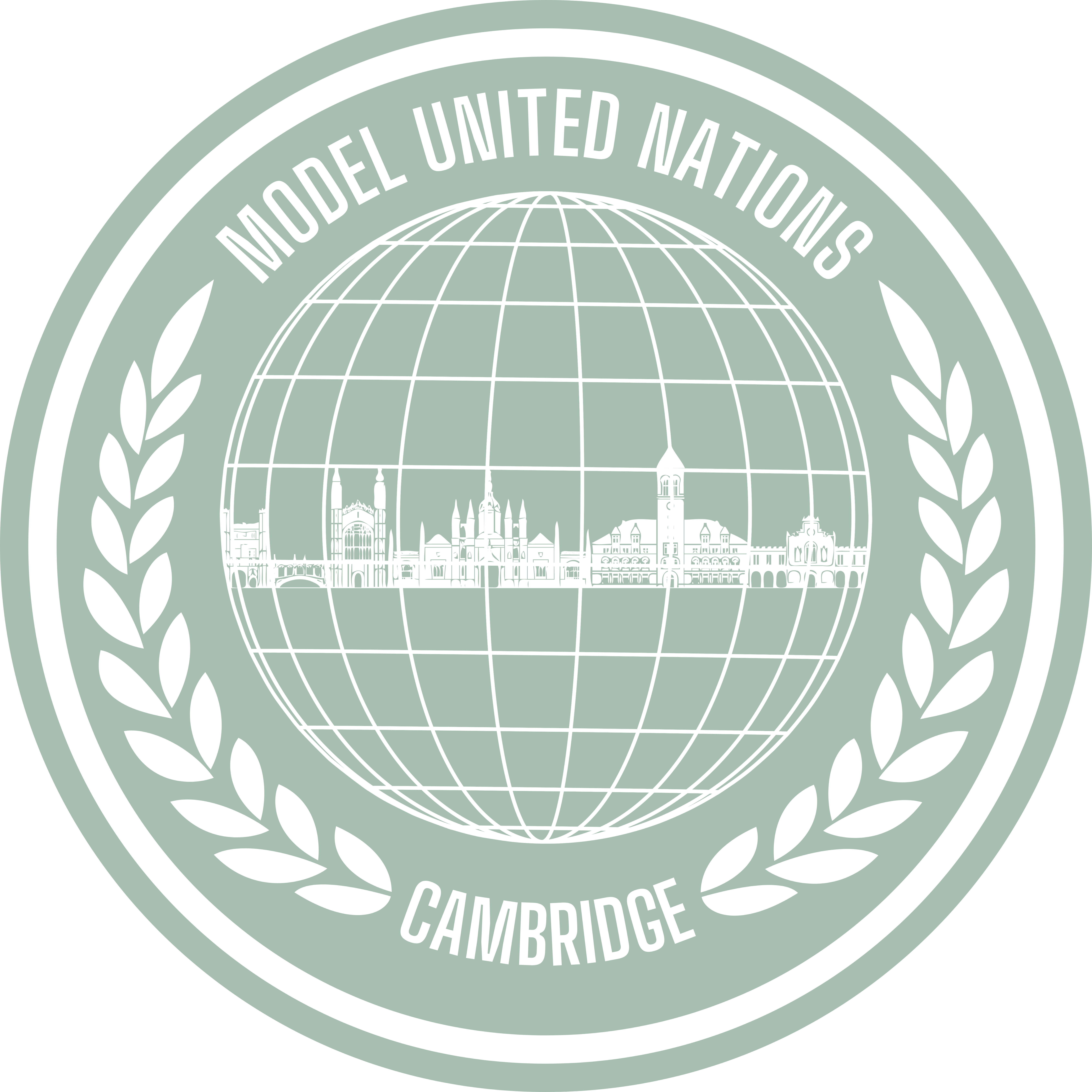DAY 1
GA1- Disarmament and International Security
Assessing the Implications of a European Nuclear Umbrella – Regulating the Use of Modern Warfare (Space, Cyber and Biological)
The Nuclear Debate Committee first resolution was Republic of Belarus’ ‘Big Beautiful Biological Ban’ which despite its name being tongue-in-cheek was a very competent paper. It called for the investigation of nations accused of developing biological weapons, giving up of weapons already developed and use of military intervention to punish those who refuse to do so.
The ban received vocal support from Republic of Türkiye, Republic of Ecuador and the Russian Federation who noticeably chose this moment to accuse Republic of Ukraine of ‘secretly developing biological weapons’ already. There was some push-back in the form of the delegate of the state of Israel questioning whether military intervention would be a gateway to more conflict and if a less aggravating method of punishment were possible. This was very quickly put down by the delegate of Republic of Belarus by asking the Israeli delegate to first look into managing conflict in their own actions before condemning the actions of others.
Amendment 1: The delegate of Palestine suggested an addition to the resolution be made to give aid to countries that have faced biological weapons in efforts to support as everyone has admitted to the atrocities of biological warfare. Other nations from the region like the Republic of Türkiye and the Islamic Republic of Iran showed support. All nations but Republic of Ukraine and Republic of India voted for, with both named abstained from voting. When asked why, they both just claimed not to be for or against the amendment and felt uneasy to vote while feeling that way. This amendment was overwhelmingly passed.
Amendment 2: The delegate of the Republic of South Africa suggested ‘thinking about development’ to deal with the countries who are approaching biological weapons, as opposed to dealing with the problem once it surfaces. This suggestion got a plethora of points of interests, most in disagreement over the practicality and actual implementation of the suggested amendment. It also relied heavily on trust from countries not to lie when questioned. This amendment was overwhelmingly rejected.
Amendment 3: The delegate of the Republic of Türkiye proposed the idea of replacing the punishment of military intervention with economic sanctions to reduce level of possible harm done to civilians. Despite this being along their original line of questioning, the delegate of the State of Israel did not comment. However, there was opposition from delegates of the State of Palestine, the Hellenic Republic (Greece) and the Russian Federation, all echoing the idea that they doubt how effective economic sanctions will be to deter governments from developing these weapons. The Republic of Belarus went a step further, claiming for certain that it wouldn’t be enough. They used the Democratic People’s Republic of Korea (North Korea) as an example of this, stating that despite their economy being sanctioned ‘into the ground’ by the UN, they continue to develop nuclear weapons and be a threat to international peace. These interjections were seemingly enough to dissuade enough people to vote for the amendment as the amendment was rejected..
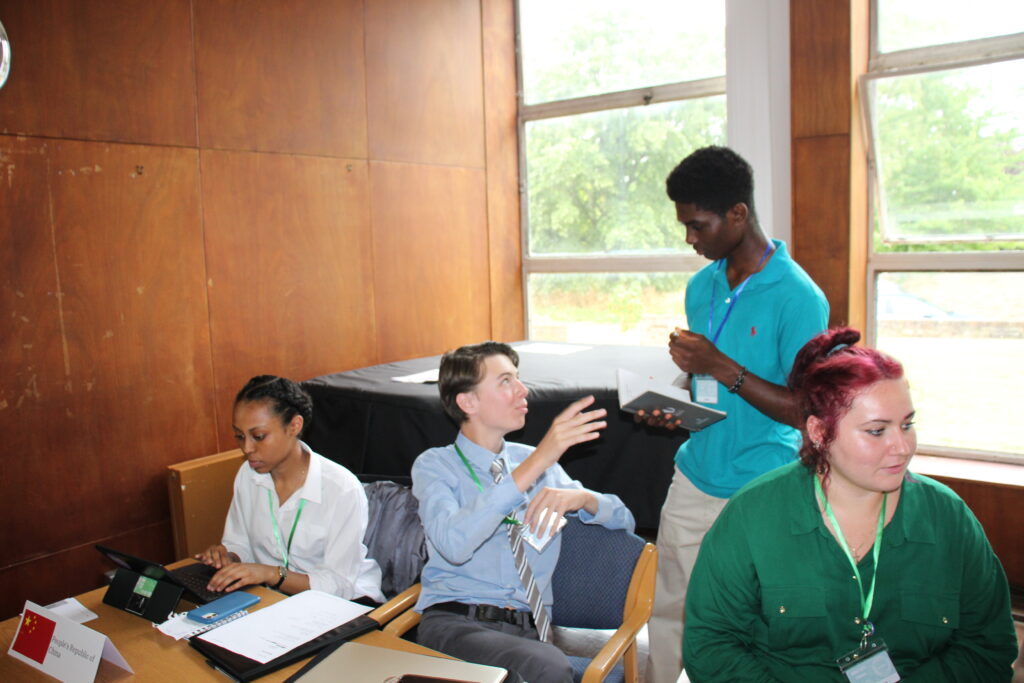
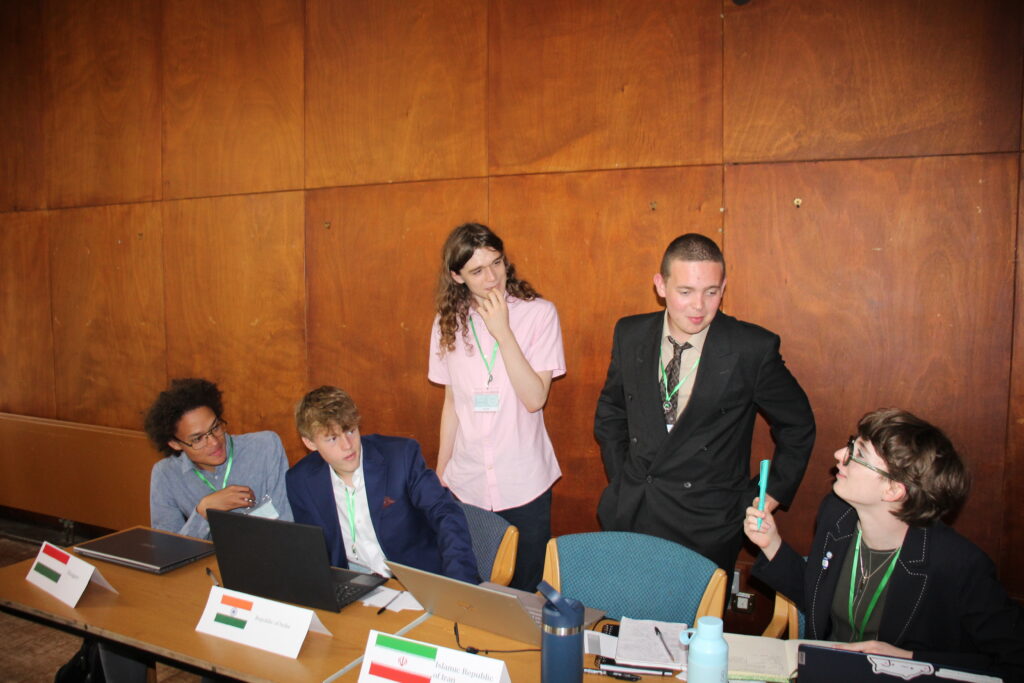
Amendment 4: The final amendment of the day was from the delegate of the Islamic Republic of Iran, which urged that UN member states attempt to stop terrorist organizations from developing and using biological weapons. The justification for this was that it may be possible that a government could fund a separate organization to develop and use these weapons, but not come under fire from the resolution as they could label the organization as terrorist rogues and not come under the intervention of the UN. Unfortunately, this Amendment had to be tabled for time concerns and will be revisited on day 2 of the committee.
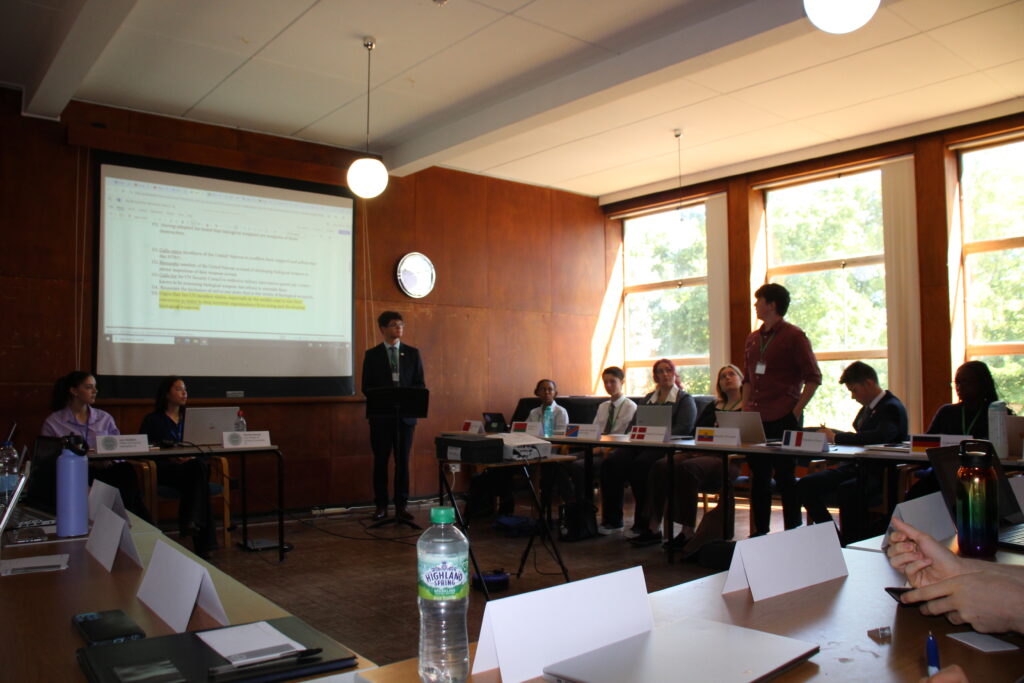
GA4- Special Political and Decolonisation
Assessing the Need for Former Imperialist States to Pay Reparations to Former Colonies – Examining the Right to Self-Determination and its Realisation
The General Assembly 4 debate concerned the reparations for the French colonisation of the People’s Republic of Algeria.
During the debate, majority of the delegates had shown support for Algeria’s resolution, and France had promised to acknowledge the colonial history between France and Algeria – as the French delegate claims that France does want to help and support Algeria. The first amendment of the debate was that French funding towards Algerian culture would be sent to organisations such as UNESCO, rather than Algeria. This was adopted as majority agreed to it, and France saw a great importance in upholding Algeria’s culture. The USA queried whether France would pay to have broken artifacts restored, after France stated that supporting and protecting Algerian culture was the most important – with France agreeing. Similarly, France had agreed to use trade as a means of supporting Algeria’s economy.
In the second amendment, the US proposed that “damages’ be changed to “mistakes” instead and argued that if there were to be any financial reparations from France, that they be “paid to UNESCO” instead of Algeria directly, so that the money goes to “where aid is actually needed”. The US also stated that it be more of a suggestion to send support to Algeria instead of them “being forced to”. France did then acknowledge that “declaring and recognising” the mistakes of France are very important. However, majority of the delegates were not in favour of the amendment.
France then led amendment three, which was for the second operative clause to be removed entirely. This clause stated that France must formally recognise the damages done to Algeria. Türkiye argued that “one government should not be responsible for another”. The delegate’s argument was that France should not have to apologise or pay reparations, as the current French government should “not be held accountable for actions of the past governments”. France mirrored this, as there was a refusal to formally apologise for events that occurred in Algeria. As Türkiye and France were the only delegates in favour of removing the clause, it was not passed.
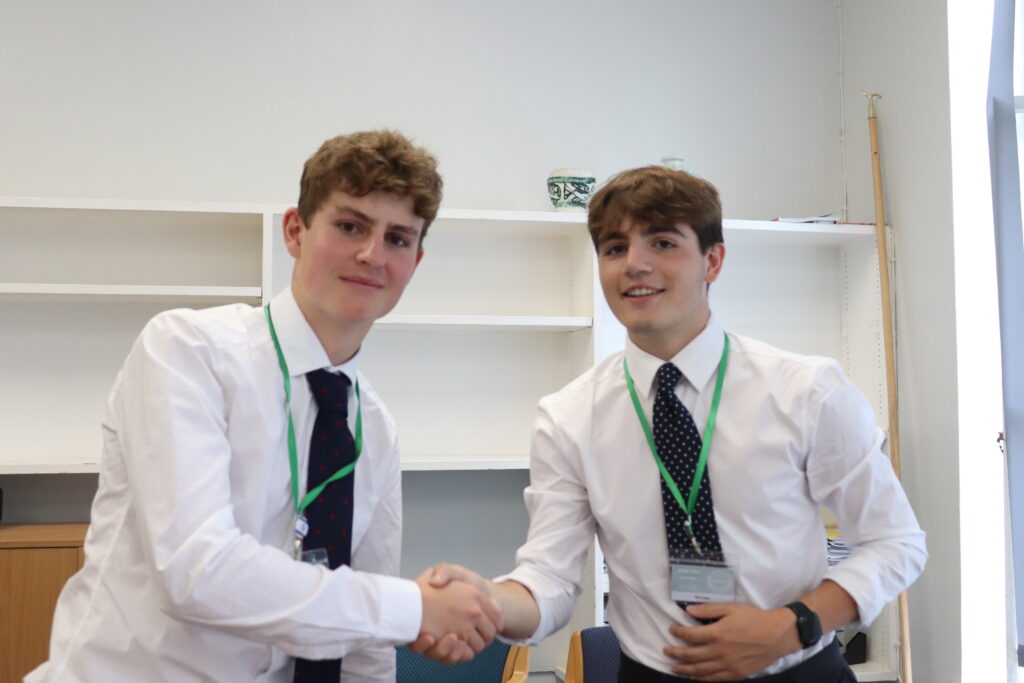
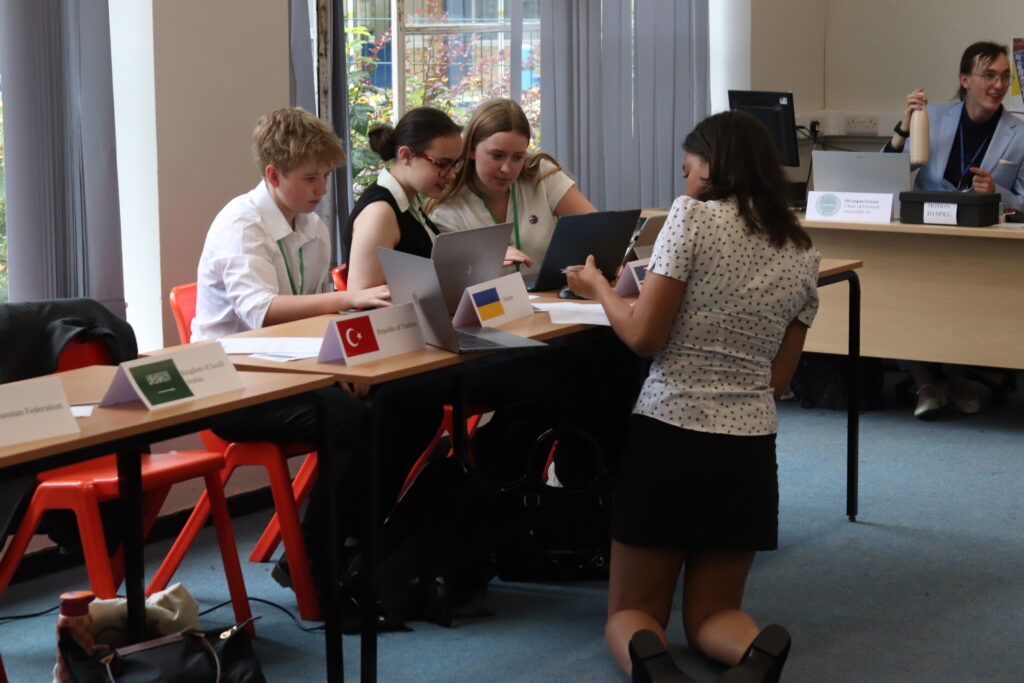
GA6 - Legal
Defining and Regulating Misinformation- Addressing the Erosion of Trust in International Institutions
During the Legal GA6 committee, delegates engaged in vigorous debates on the responsibility of former imperialist states to provide reparations to former colonies, focusing on the right to self-determination and the role of misinformation in perpetuating colonial narratives.
The session began with the introduction of resolutions by the delegations, followed by amendments and extensive debate. Delegates raised critical points regarding the definitions of misinformation and disinformation, emphasizing the need for clear, universally agreed-upon terminology for imperialist states to pay reparations to former colonies. Russia stressed how Eurocentric misinformation dominates narratives and called for precise definitions of misinformation to prevent manipulation. Hungary questioned the balance between regulating misinformation and upholding free speech when stating in their pint of discussion “how important is it to the delegation of Russia that the right of free speech is upheld”, in which the delegation of Russia believes that it relevant to uphold free speech, however they believe that there should be a restriction whilst expressing opinions on social media. Nevertheless, the delegation of Pakistan advocated for internationally negotiated definitions through the UN to avoid unilateral interpretations.
Multiple amendments sought to refine these definitions. The Philippines highlighted the need to differentiate unintended misinformation from deliberate disinformation. Israel proposed that educational programs should build media literacy, stressing equal access despite disparities in national resources. Palestine raised concerns over the risk of biased narratives if educational initiatives were not UN supervised, starting debates over how to ensure neutrality and inclusivity in curricula.
Delegates then debated amendments on acknowledging pro-Western bias in global information. Algeria and India emphasized the disproportionate danger of Western misinformation due to its dominance in international discourse, while Russia concurred that Western-centric narratives often overshadow alternative perspectives. Votes on these amendments passed by clear majorities.
Further discussions focused on replacing the term “fake news” with “misinformation” to avoid politicized language, an amendment supported by Panama but opposed by the United States, citing concerns over precision. Algeria amended to replace vague references to “malicious intent” with context-specific terms, which passed following clarification. Palestine, despite its observer status and inability to vote, raised an amendment calling for safeguards to ensure that dominant states do not exploit educational facilities to propagate biased narratives. However, this amendment failed to pass, reflecting divisions on how best to guarantee neutrality.
Subsequent amendments addressed the creation of international institutions to oversee information integrity, balancing the influence of powerful states within the UN system. Ukraine and Panama proposed multiple approaches for clearer communication and more representative language on regional conflicts, including Gaza and Israel’s right to self-defense. These amendments passed, underscoring the committee’s commitment to nuanced and inclusive language.
Ultimately, Russia’s resolution on establishing vigorous methods to combat misinformation, promote equal education, and respect selfdetermination passed with 14 votes in favour.
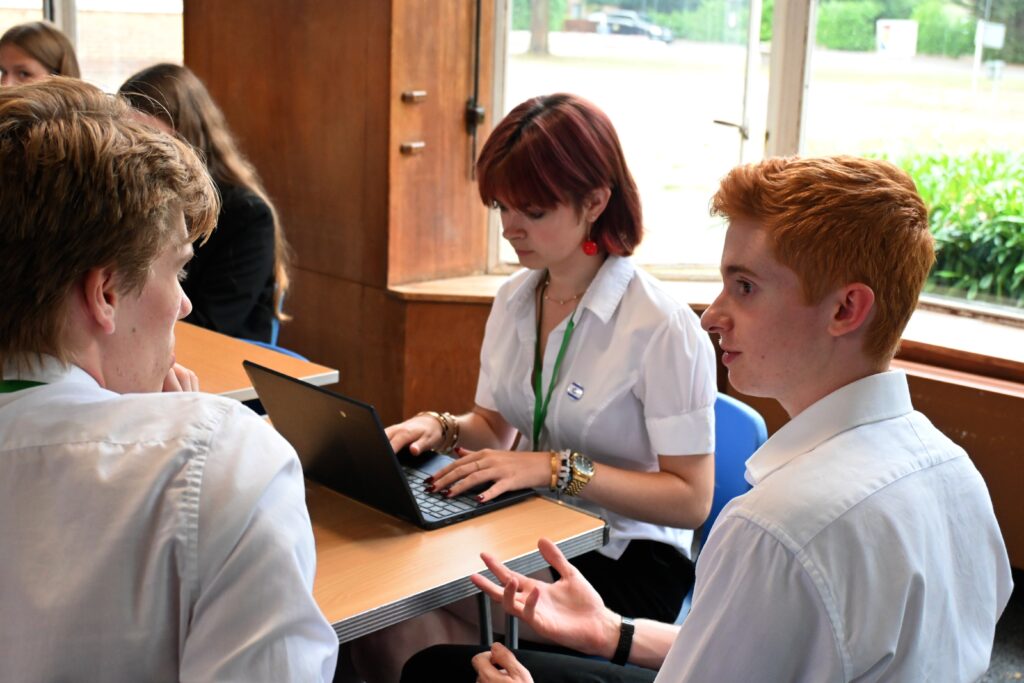
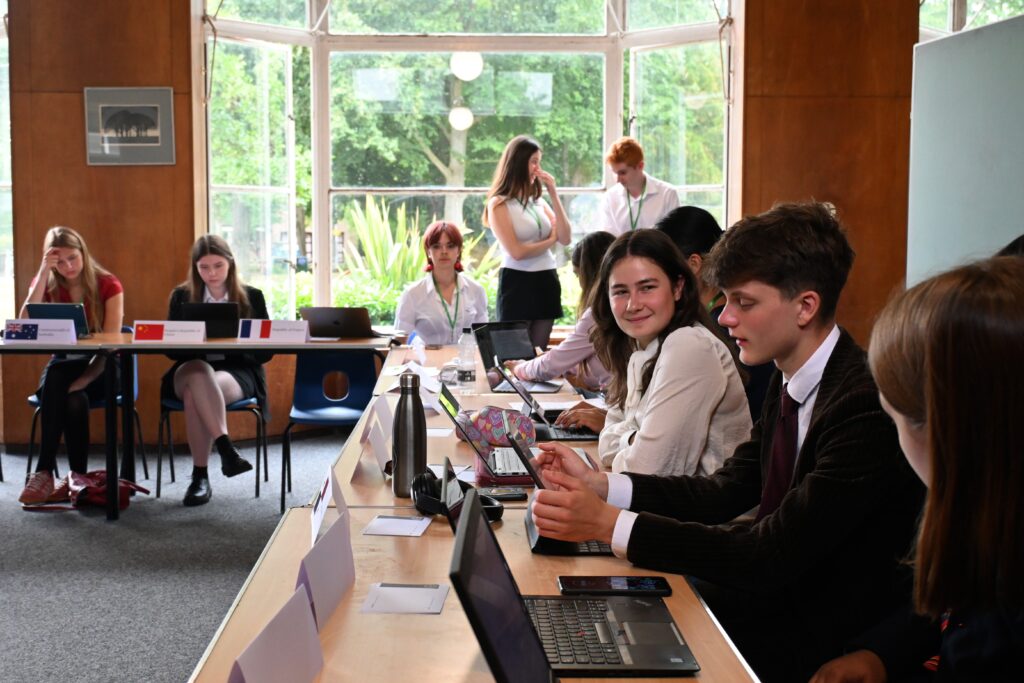
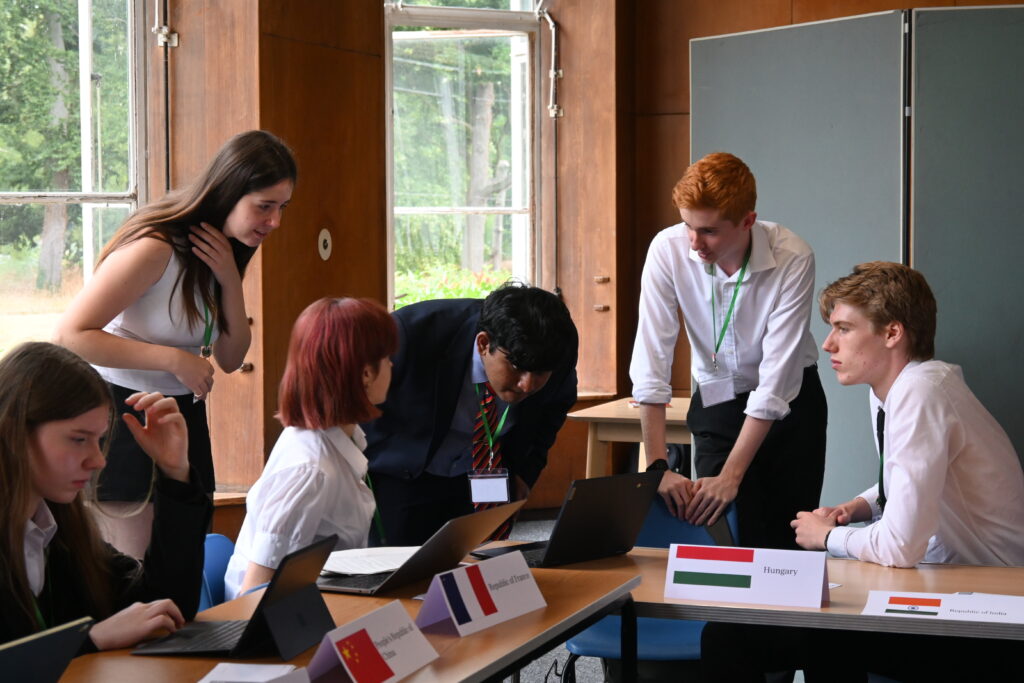
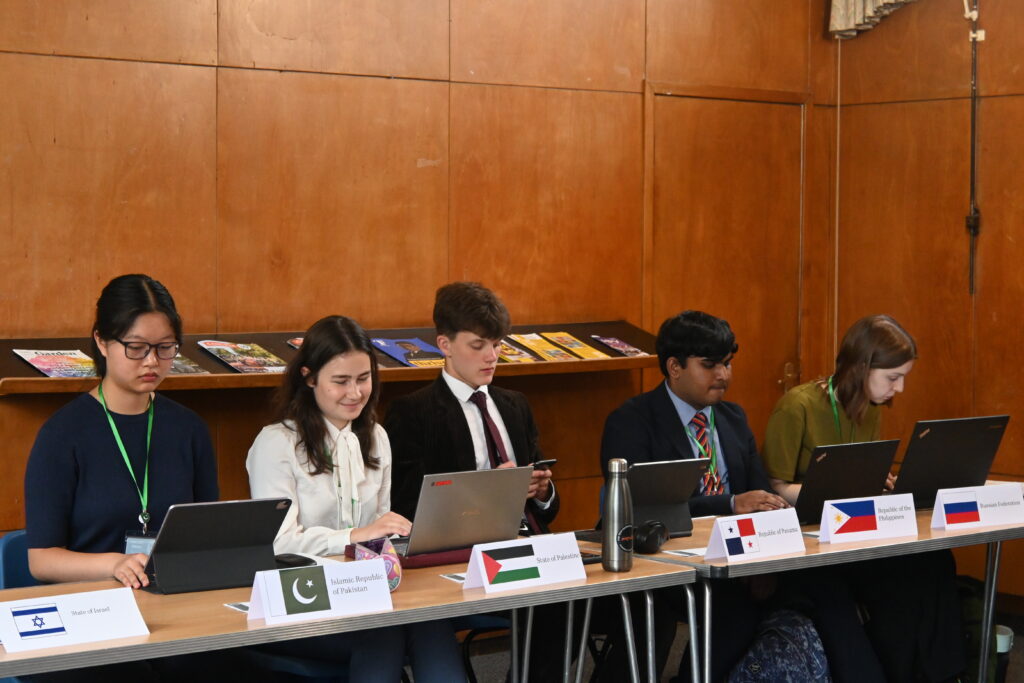
Economic and social council
Preparing for the Expected Increase in Natural Disasters Due to Climate Change – Preparing for Future Global Health Crises
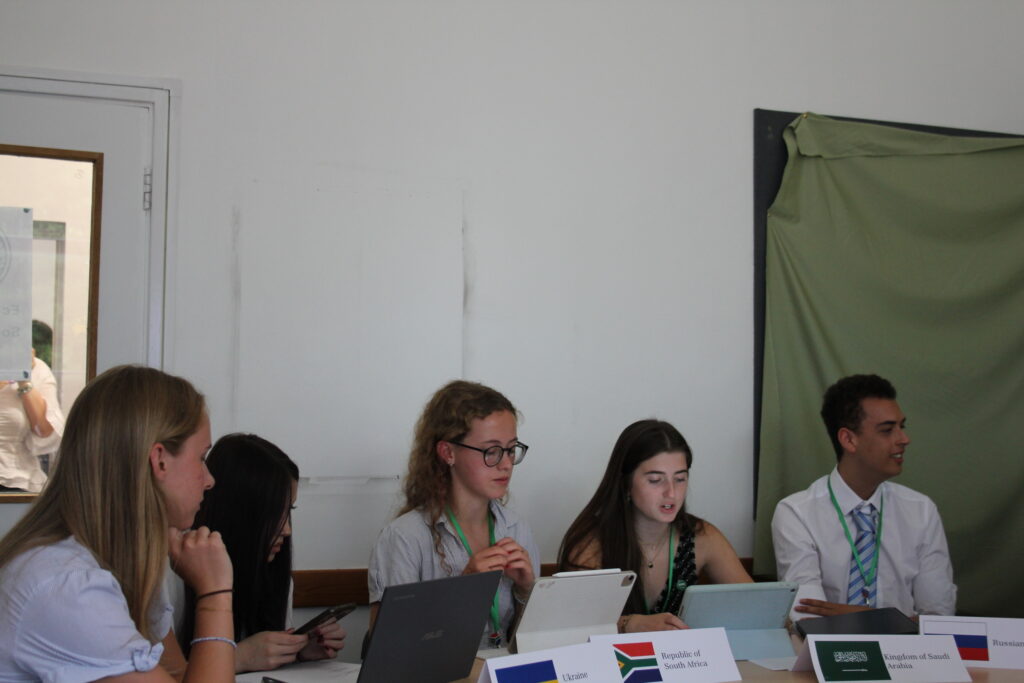
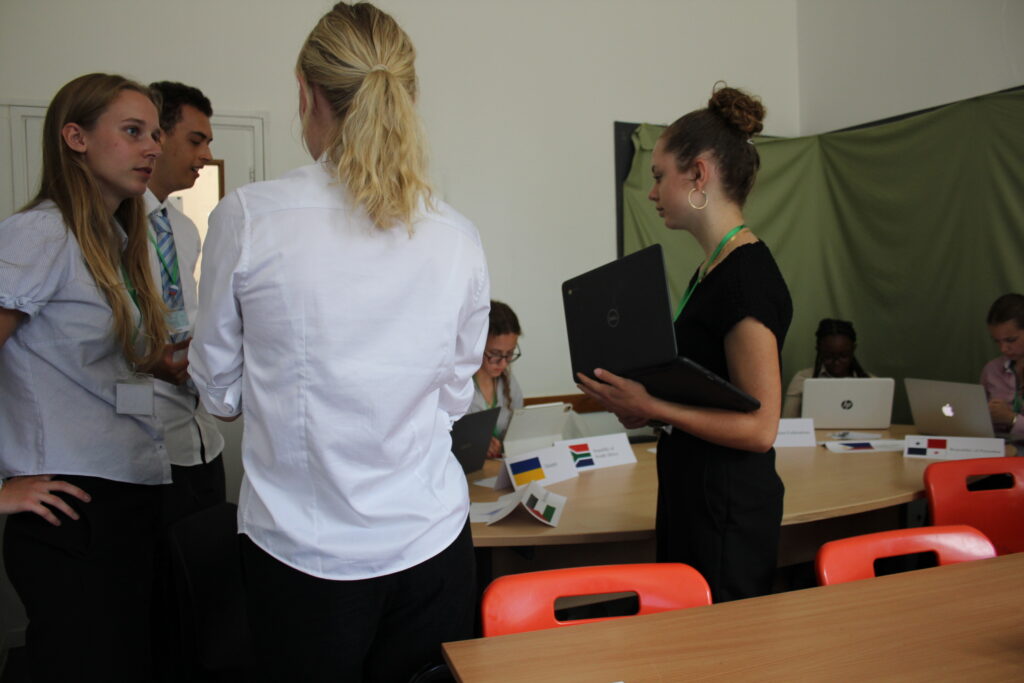
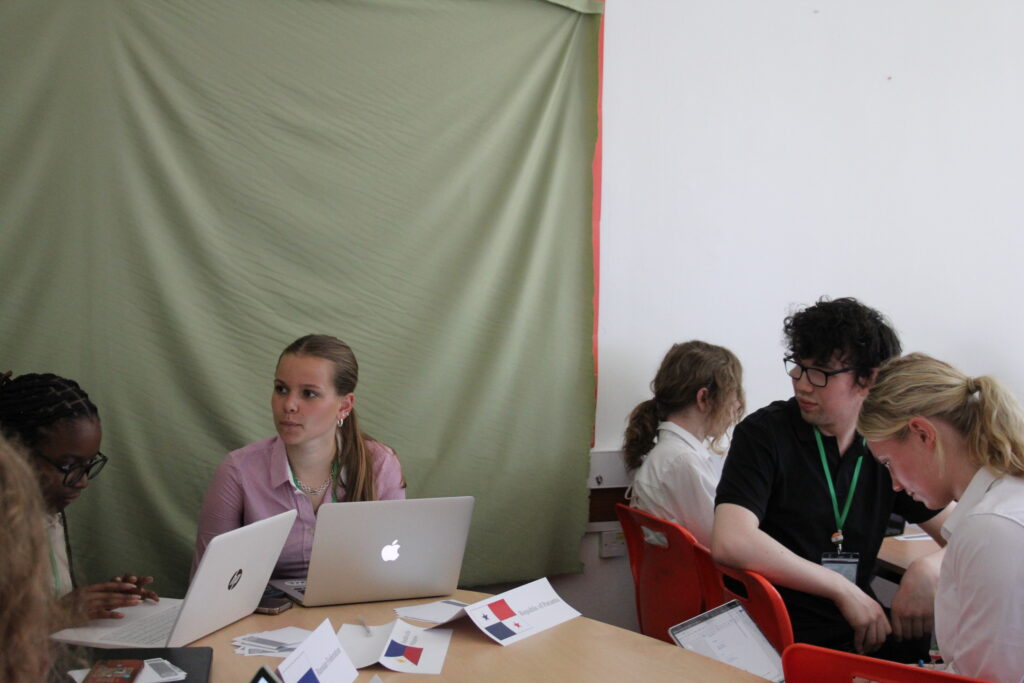
In the lobbying for economics and social, the Russian federations resolution was about the Eco structure such as dams. However, Iran ‘couldn’t relate’. They found no relevance as their country doesn’t really have natural disasters. Palestine also rejected all offered resolutions as they have no vote. They have no resolution and are only here to ‘debate Israel’. India, USA, Saudi Arabia and Panama all said no to the carbon neutrality resolution suggested by Russia. One reason for this is Saudi Arabia’s high use of oil. They have the secondlargest amount of oil reserves in the world with just over 267 billion barrels.
The first debate session focused on the resolution led by the Democratic Republic of Congo, in ‘assisting developing nations in limiting impact of climate change’. The Congo has the second largest rainforest in the world, and they focused on discussing the reduction carbon emissions and transitioning to renewable energy. Despite the Democratic Republic of Congo not being industrialised, they have one of the largest carbon emissions in the world, so they want to speed up the transition to renewable sources. Delegates had discussions about many aspects of the resolution. One discussion was over definitions of “developed” countries, for example, India.
3 amendments were made, increasing the number of votes for the resolution from 11 to 12. With the USA, Russia and Saudi Arabia against the final resolution. The amendments changed the focus from specifically rainforests to all natural importance. However, they would only focus on the few specific areas important to the UN and not thousands of areas such as botanical gardens or nature reserves as some don’t give off enough carbon dioxide to effect climate change. They also helped to ensure as little bias as possible as the areas would be a chosen, unrelated committee to do this. This resolution will be debated in the forum assembly.
Security Council
From the Ambassador speeches, it is visible that many of the delegates of the United Nations have expressed a belief in the eradication of misinformation. The debate, which was extended several times, debated two important topics- the freedom of press and the changes in nuclear policies.
The first debate was extended several times and instead of 60 minutes ended up being approximately an hour and a half. The initial resolution was concerned with trust and transparency and the acknowledgment of the free press, observing global obstruction and violence against members of the press, and concerning the threat to the rights and freedoms of the press. The first-degree amendment was suggested by the delegate of Ecuador, arguably the most active within the debate. The delegate expressed that their belief that the content of the press should be regulated and checked for propagandaenforced misinformation- to avoid it and minimize potentially ill intentions of the government and suggested a neutral, internationally represented council, which went through background checks to ensure neutrality and impartiality
In response to the amendment, the Turkish and Hungarian delegates have expressed concern over the infringement on national sovereignty and security with Turkey stating that the “regulation of the press should remain the sole responsibility of individual states”. Hungary has also stated that is up for the country’s government to determine to what extent they will allow the freedom of press. When repeatedly asked about the violence that certain governments use against independent journalists, the ambassador of Hungary said that the government does what is best for their country. The United States delegate expressed concerns regarding bias and enforceability, questioning how such a body could fairly represent nations with vastly different political systems, with France raising a similar point about culture maybe not directly affecting the freedom of press, but cultural bias needing to be considered. The representatives of China and the Democratic Republic of Congo then voiced doubts about the feasibility of ensuring political neutrality through background checks alone.
Despite opposition, Ecuador continued and supported the idea that that neutrality and transparency were the building blocks of the proposed council, and that the council would only function in times of conflict to monitor misinformation. As the debate continued, Panama introduced a second-degree amendment, proposing that rather than an entirely new neutral body, a more efficient solution would be to create a new branch within UNESCO (The United Nations Educational, Scientific and Cultural Organization), which aims to “promote peace and security through international cooperation in education, sciences, culture, and communication” (UNESCO, 2024). This new branch would be tasked with overseeing legal actions against journalists and press violations with international accountability. With 8 votes for and 7 against, the amendment was passed.
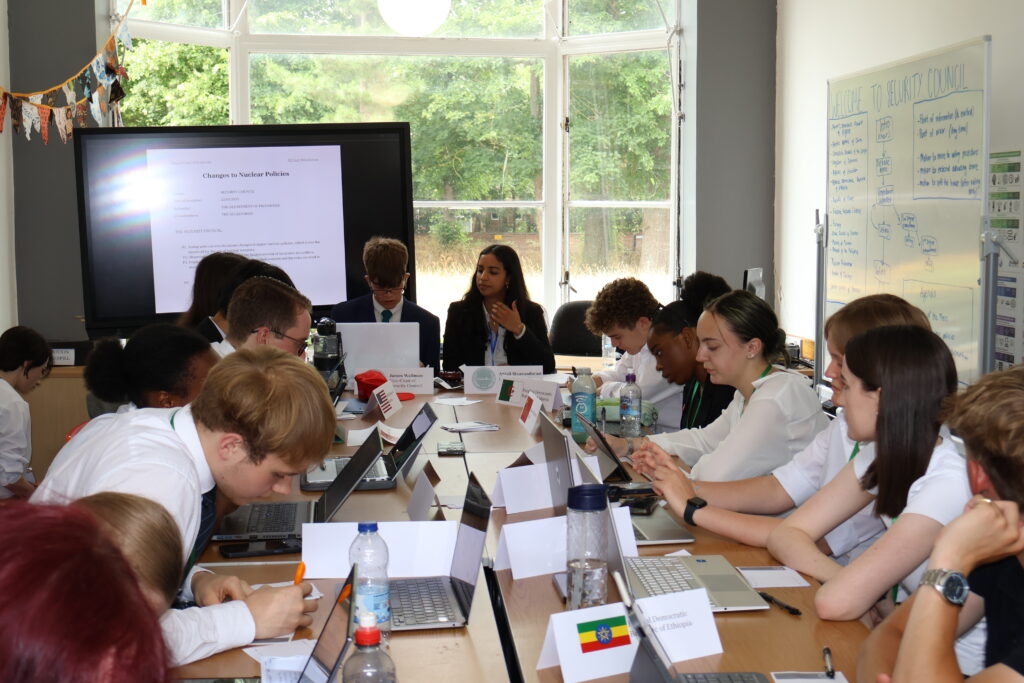
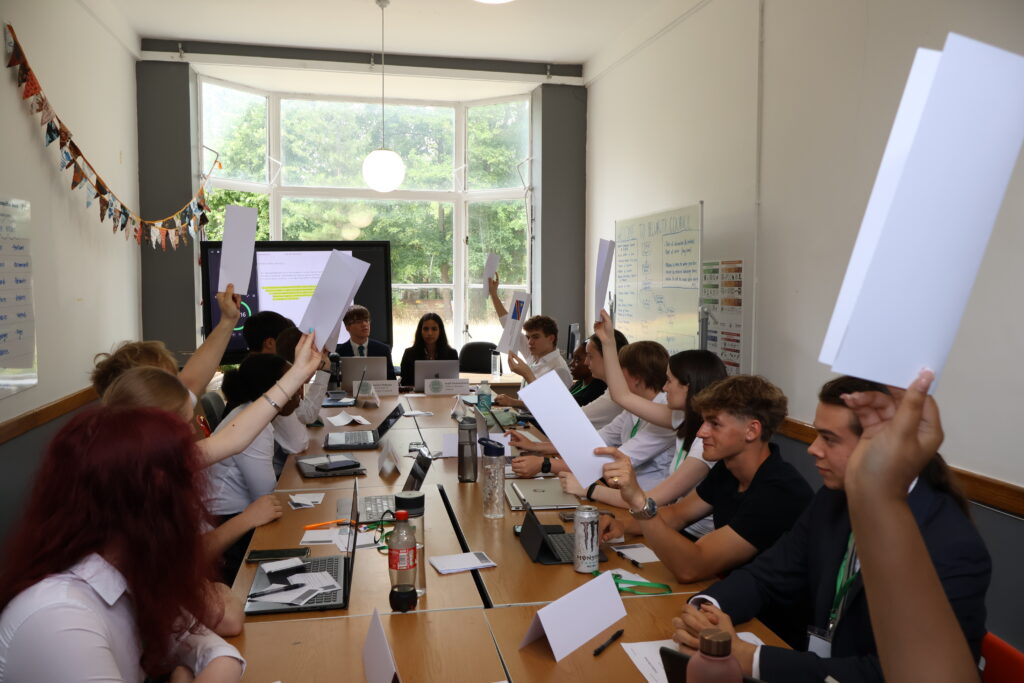
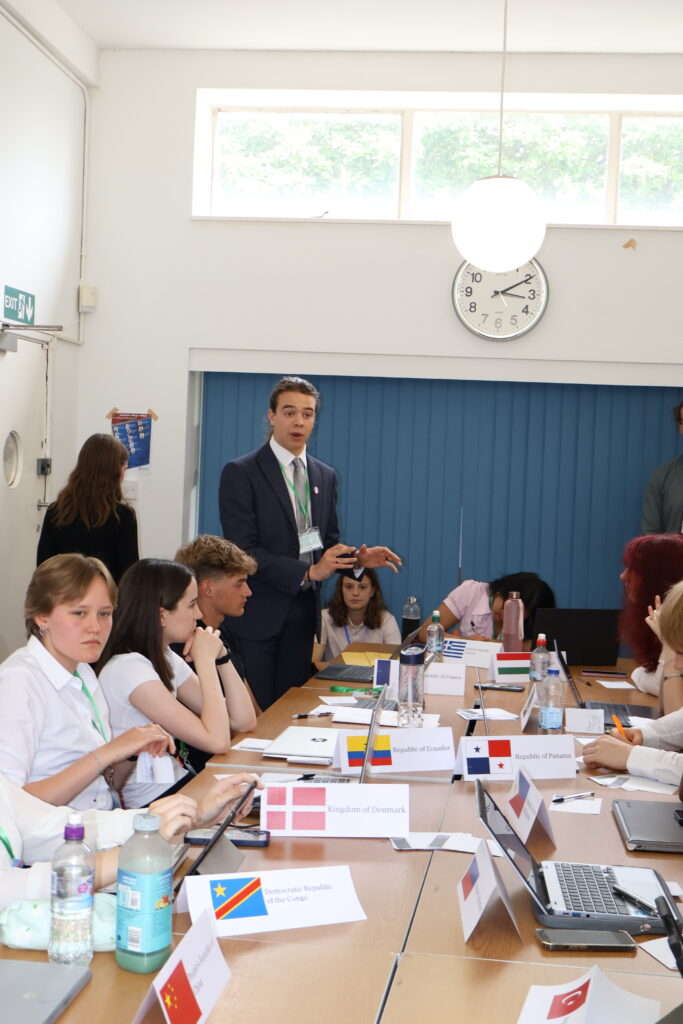
The delegate of the United States has then proposed a third amendment which “condemns all forms of violence, intimidation, arbitrary detention, and censorship directed at journalists and independent press organizations” and is an “arm of the UN Human Rights Council to monitor the in ongoing violations of human rights against journalists”. The ambassadors of the nations of Turkey, Algeria and China have emphasized their sovereign rights to enforce pressrestrictions, however despite the this the amendment have been passed with the USA delegate clarifying that the language could be reviewed to better accommodate cultural and legal differences.
Following the break, the third amendment was expanded to include a clause urging all member states to recognize when press freedom is manipulated to shield extremism or malicious campaigns. The cause was supported by the delegate of Turkey while the representatives of Ecuador, Panama, and others voiced concerns about the ambiguity of the term “malicious campaigns” and “censorship” and the potential for misuse. A second amendment was introduced to clarify the clause, instead emphasizing the funding of the members who chose to be a part of the “press filtering council” training in areas of conflict, which passed with broader support.
However, by the end of the debate, the final resolution faced a critical blow. China issued a veto vote, causing the resolution to fail. A revote was conducted with abstentions no longer permitted, yet vetoes from China, the United States, and France ultimately sealed the resolution’s fate causing to fail.
The second part of the Security Council debates shifted into the discussion of the changes in nuclear policies with concerns raised over the lowering of thresholds for nuclear weapon use, the increased risk of escalation, and the stagnation of disarmament efforts.
An amendment was presented once again by the delegate of Ecuador which encouraged the nuclear-free zones to be set up particularly in conflict-prone areas citing Latin- America as example- the continent is considered a nuclear-free zone primarily because of the Treaty of Tlatelolco of 1969 which “prohibits the testing, use, manufacture, production, or acquisition of nuclear weapons by any state in the region.” (How Latin America Helped Drive Nuclear Non-Proliferation, 2022). The delegate emphasized that in the current global climate, warfare risks could no longer be trusted not to escalate. Hungary pushed back, referencing regions like the Middle East, where Israel’s position complicates disarmament. Ecuador responded firmly, challenging the legitimacy of “rights” to possess weapons and advocating for collective responsibility.
The proposal of this amendment has raised skepticism from Hungary and United States delegations expressing that they do believe that the amendment is sufficient to be able to reduce conflict escalation. The representative of Hungary has further expressed that if nuclear disarmament would happen it should happen immediately and for everyone at the same time with the ambassador of Algeria expressing the concern that if this was the solution then countries like Russia, China and France might decide to veto the proposal which would make the disarmament difficult, however the delegate of the Russian Federation has expressed that they willing to cooperate with other countries the USA delegate has acknowledged the concern and assured that with continued dialogue and diplomacy this could be avoided.
The French delegate has then submitted an amendment “recommending the gradual and pragmatic deconstruction of nuclear arsenals globally, aiming to avoid destabilization.” The delegate took a provocative yet philosophical stance expressing the importance of trust between the nations as well as acknowledging the historical role of war in society, stating, “we like to kill things,” but emphasized the need for disarmament based on trust — not a “ban on war and conflict” itself. The Algerian delegate expressed the concern that despite us getting rid of the sense of fear within our society is important to acknowledge that we will continue to “kill things” with nuclear weapons or not. The ambassador of France acknowledged Algeria’s stance and assured them with the phrase “trust me bro” and further expressed that although the human nature is prone to self-destruction it is important that “in the end of it all there must be a victor and if we nuke each other than that will be the end of humanity and there will be no future”.
Several countries have spoken out against the enforcement- Turkey raised practicality, Pakistan questioned the UN’s involvement, and China asked how full disarmament would be verified. The delegate of France admitted the process would be complex, trust-based, and time consuming, but insisted it was necessary. The ambassador of Russian Federation further voiced concern over the European nuclear umbrella, while Hungary noted that some nations — like North Korea and Israel — were unlikely to cooperate with the enforcement. The USA reaffirmed its belief in disarmament but was unwilling to lead without broader participation and being the “forerunner in isolation”. Despite the challenges and questioning, the majority of the Council voted for the amendment and therefore it passed.
Further, a more ambitious amendment was proposed recommending full disarmament by the year 2050, which was met with heavy backlash. The DRC threatened that any non-compliant country should be disbanded from the UN, while Ethiopian, Panama, and Greek delegates expressed concerns about the practicality of such a goal. Greece supported the spirit of the amendment but aligned with France in favoring a timeline without rigid deadlines. Algeria voiced its support, drawing attention to the humanitarian cost of nuclear war. In response to Turkey’s earlier comment naming uncooperative countries, the Israeli delegate was summoned for clarification. Ultimately, this amendment failed.
Thank you for reading the first edition of The Resolution Roundup, a new edition will be on the way shortly! – The Press Team

